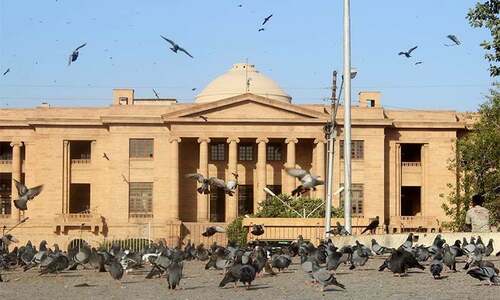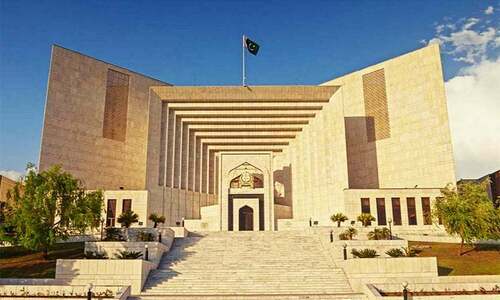ISLAMABAD: The president and secretary of the Sindh High Court Bar Association (SHCBA) challenged before the Supreme Court (SC) on Saturday the Judicial Commission of Pakistan’s (JCP) discretion in the appointment of judges to the apex Court.
Through a joint petition, the petitioners, Salahuddin Ahmed and Mohammad Omer Soomro, have sought a declaration that the JCP should structure its discretion of elevating superior court judges by inviting suggestions from all relevant stakeholders, including judges, senior lawyers and bar representatives, members of the parliamentary committee, federal and provincial governments, civil society and litigants.
The suggestions should ask for structuring the process of judicial appointments to the superior courts and make it more objective and transparent by conducting seminars, workshops or consultations as may be necessary in this regard to hear all relevant viewpoints, the petition said.
It also pleaded that the apex court should direct the JCP to frame comprehensive and detailed rules or guidelines to structure both the process of appointments and criteria and parameters for appointments after considering the different aspects in light of suggestions, directives or framework the Supreme Court may deem it appropriate to make.
The petition also pleaded that till the pendency of the present petition, the seniority principle should be adhered to strictly in the elevation of the high court judges to the apex court.
The petition recalled how the five of the last seven judges elevated to the Supreme Court were not the senior-most in their high courts and during the tenure of former chief justice Mian Saqib Nisar, Justice Muneeb Akhtar was elevated to the apex court despite being fourth in seniority in the Sindh High Court (SHC).
Likewise during the tenure of the former chief justice, Asif Saeed Khan Khosa, Justice Qazi Amin Ahmed was elevated to the apex court in April 2019 although he had retired from the Lahore High Court (LHC) only a month earlier while ranked 26th in seniority.
Similarly Justice Aminuddin Ahmed was only fifth in seniority in the LHC prior to his elevation to the apex court, Justice Sayyed Mazahir Ali Akbar Naqvi was elevated to the Supreme Court despite being third in seniority in the LHC and most recently during the incumbent Chief Justice of Pakistan Gulzar Ahmed’s period, Justice Mohammad Ali Mazhar was elevated to the apex court despite being fifth in seniority in the SHC, the petition highlighted.
This stark departure from the seniority principle — to the extent that deviation has become the new norm and adherence the exception — is a phenomenon that has started from 2018, the petition regretted, stating that previously, the appointment of junior judges from the high courts to the apex court was an exception and even then it was at most the senior-puisne judge who would be elevated and that too with the consent of his chief justice.
This recent trend of completely ignoring the seniority principle has led to serious concerns and misgivings among the legal fraternity and within the judiciary and even inside the JCP and the Parliamentary Committee, the petition argued.
Different bar councils and associations have been protesting the same since 2018 when Justice Muneeb Akhtar was appointed, the petition said.
Unfortunately reservations by different bar associations were ignored and the same have now culminated in resolutions passed by all the provincial and ICT bar councils as well as their principal high court bar associations, the Supreme Court Bar Association and the Pakistan Bar Council.
The abandonment of the seniority principle without any cogent reasons has given rise to dissensions among the JCP and the parliamentary committee, the petition argued, adding that on the other hand, superseded judges have been voicing their grievances at being bypassed both privately and publicly.
Not only does this reflect poorly on the reputation of the judicial institution but it is only natural that out-of-turn promotions have a negative impact on the morale and performance of those judges who feel that they have been bypassed unfairly and without cogent reasons.
Even the Attorney General of Pakistan has opined that there is a need to improve the process of judicial appointments to the apex court and frame objective and transparent criteria for the same.
Published in Dawn, November 28th, 2021



































